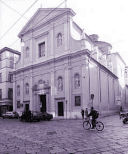33. Hear another parable: There was a certain householder, which planted a vineyard, and hedged it round about, and dug a winepress in it, and built a tower, and let it out to husbandman, and went into a far country:
34. And when the time of the fruit drew near, he sent his servants to the husbandman, that they might receive the fruits of it.
35. And the husbandman took his servants, and beat one, and killed another, and stoned another.
36. Again, he sent other servants more than the first: and they did to them likewise.
37. But last of all he sent to them his son, saying, They will reverence my son.
38. But when the husbandman saw the son, they said among themselves, This is the heir; come, let us kill him, and let us seize on his inheritance.
39. And they caught him, and cast him out of the vineyard, and slew him.
40. When the lord therefore of the vineyard comes, what will he do to those husbandmen?
41. They said to him, He will miserably destroy those wicked men, and will let out his vineyard to other husbandmen, which shall render him the fruits in their seasons.
42. Jesus said to them, Did you never read in the Scriptures, The stone which the builders rejected, the same is become the head of the corner: this is the Lord's doing, and it is marvelous in our eyes?
43. Therefore say I to you, The kingdom of God shall be taken from you, and given to a nation bringing forth the fruits thereof.
44. And whoever shall fall on this stone shall be broken: but on whomever it shall fall, it will grind him to powder.
CHRYS; The design of this further parable is to show that their guilt was heinous, and unworthy to be forgiven.
ORIGEN; The householder is God, who in some parables is represented as a man. As it were a father condescending to the infant lisp of his little child, in order to instruct him.
PSEUDO-CHRYS; He is called man, by title, not by nature ; in a kind of likeness, not in verity. For the Son knowing that by occasion of His human name. He himself should be blasphemed as though he were mere man. Spoke therefore of the Invisible God the Father as man; He who by nature is Lord of Angels and men, but by goodness their Father.
JEROME; He has planted a vine of which Isaiah speaks, The vine of the Lord of Hosts is the house of Israel. And hedged it round about; i.e. either the wall of the city, or the guardianship of Angels.
PSEUDO-CHRYS; Or, by the hedge understand the protection of the holy fathers, who were set as a wall around the people of Israel.
ORIGEN; Or, the hedge which God set round his people was His own Providence; and the winepress was the place of offerings.
JEROME; A winepress, that is to say, An altar; or those winepresses after which the three Psalms, the 8th, the 80th, and the 83rd are entitled, that is to say, the martyrs.
HILARY; Or, he set forth the Prophets as it were winepresses, into which an abundant measure of the Holy Spirit, as of new wine, might flow in a teeming stream.
PSEUDO-CHRYS; Or, the winepress is the word of God, which tortures man when it contradicts his fleshly nature.
JEROME; And built a tower therein, that is, the Temple, of which it is said by Micah, And you, O cloudy tower of the daughter of Sion.
HILARY; Or, The tower is the eminence of the Law, which ascended from earth to heaven, and from which, as from a watch-tower, the coming of Christ might be spied. And let it out to husbandmen.
PSEUDO-CHRYS; When, that is, Priests and Levites were constituted by time Law, and undertook the direction of the people. And as an husbandman, through the offer to his Lord of his own stock, does not please him so much as by giving him the fruit of his own vineyard; so the Priest does not so much please God by his own righteousness, as by teaching the people of God holiness; for his own righteousness is but one, but that of the people manifold. And went into a far country.
JEROME; Not a change of place, for God, by whom all things are filled, cannot be absent from any place; but He seems to be absent from the vineyard, that he may leave the vine-dressers a freedom of acting.
CHRYS; Or, it applies to His long-suffering, in that he did not always bring down immediate punishment on their sins.
ORIGEN; Or, because God who had been with them in the cloud by day, and in the pillar of fire by night, never after showed Himself to them in like manner. In Isaiah the people of the Jews is called time vineyard, and the threats of the householder are against tire vineyard; but in the Gospel not the vineyard but the husbandmen are blamed. For perchance in the Gospel the vineyard is the kingdom of God, that is, the doctrine which is contained in holy Scripture; and a man's blameless life is the fruit of the vineyard. And the letter of Scripture is the hedge set round the vineyard, that the fruits which are hid in it should not be seen by those who are without.
The depth of the oracles of God is the winepress of the vineyard, into which such as have profited in the oracles of God pour out their studies like fruit. The tower built therein is the word concerning God Himself, and concerning Christ's dispensations. This vineyard He committed to husbandman, that is, to the people that was before us, both priests and laity, and went into a far country, by His departure giving opportunity to the husbandman. The time of the vintage drawing near may be taken of individuals, and of nations. The first season of life is in infancy, when the vineyard has nothing to show, but that it has in it the vital power. As soon as it comes to be able to speak, then is the time of putting forth buds. And as the child's soul progresses, so also does the vineyard, that is, the word of God; and after such progress the vineyard brings forth the ripe fruit of love, joy, peace, and the like. Moreover to the nation who received the Law by Moses, the time of fruit draws near.
RABAN; The season of fruit, He says, not of rent-paying, because this stiff-necked nation brings forth no fruit.
CHRYS; He calls the Prophets servants, who as the Lord's Priests offer the fruits of the people, and the proofs of their obedience in their works. But they showed their wickedness not only in refusing the fruits, but in having indignation against those that come to them, as it follows, And the husbandmen took his servants, and beat one, and killed another, and stoned another.
JEROME; Beat them, as Jeremiah, killed them, as Isaiah, stoned them, as Naboth and Zacharias, whom they slew between the temple and the altar.
PSEUDO-CHRYS; At each step of their wickedness the mercy of God was increased, and at each step of the Divine mercy the wickedness of the Jews increased; thus there was a strife between human wickedness and Divine goodness.
HILARY; These more than the first who were sent, denote that time, when, after the preaching of single Prophets, a great number was sent forth together.
RABAN; Or, the first servants who were sent were the Lawgiver Moses himself, and Aaron the first Priest of God; whom, having beaten them with the scourge of their tongue, they sent away empty; by the other servants understand the company of the Prophets.
HILARY; By the Son sent at last, is denoted the advent of our Lord.
CHRYS; Wherefore then did He not send Him immediately? That from what they had done to the others they might accuse themselves, and putting away their madness they might reverence His Son when He came.
PSEUDO-CHRYS; He sent Him not as the bearer of a sentence of punishment against the guilty, but of an offer of repentance; He sent Him to put them to shame, not to punish them.
JEROME; But when He says, They will reverence my Son, He does not speak as in ignorance. For what is there that this householder (by whom in this place God is intended) knows not? But God is thus spoken of as being uncertain, in order that free-will may be reserved for man.
CHRYS; Or He speaks as declaring what ought to be; they ought to reverence Him; thus showing that their sin was great, and void of all excuse.
ORIGEN; Or we may suppose this fulfilled in the case of those Jews who, knowing Christ, believed in Him. But what follows, But when the husbandmen saw the son, they said among themselves, This is the heir, come let us kill him, and let us seize on the inheritance, was fulfilled in those who saw Christ, and knew Him to be the Son of God, yet crucified Him.
JEROME; Let us inquire of Arrius and Eunomius. See here the Father is said not to know somewhat. Whatever answer they make for the Father, let them understand the same of the Son, when He says that He knows not the day of the consummation of all things.
PSEUDO-CHRYS; But some say, that it was after His incarnation, that Christ was called a Son in right of His baptism like the other saints, whom the Lord refutes by this place, saying, I will send my Son. Therefore when He thus meditated sending His Son after the Prophets, He must have been already His Son. Further, if He had been His Son in the same way as all the saints to whom the word of God was sent, He ought to have called the Prophets also His sons, as He calls Christ, or to call Christ His servant, as He calls the Prophets.
RABAN; By what they say, This is the Son, He manifestly proves that the rulers of the Jews crucified the Son of God, not through ignorance, but through jealousy. For they understood that tit was He to whom the Father speaks by the Prophet, Ask of me, and I shall give you the heathen for your inheritance. The inheritance given to the Son is the holy Church; an inheritance not left Him by His Father when crying, but wonderfully purchased by His own death.
PSEUDO-CHRYS; After His entry into the Temple, and having cast out those who sold the animals for the sacrifices, then they took counsel to kill Him, Come, let us kill him. For they reasoned among themselves, It will happen that the people hereby shall disuse the practice of sacrificing, which pertains to our gain, and shall be content to offer the sacrifice of righteousness, which pertains to the glory of God; and so the nation shall no more be our possession, but shall become God's. But if we shall kill Him, then there being none to seek the fruit of righteousness from the people, the practice of offering sacrifice shall continue, and so this people shall become our possession; as it follows, And the inheritance shall be ours. These are the usual thoughts of all worldly Priests, who take no thought how the people shall live without sin, but look to how much is offered in the Church, and esteem that tile profit of their ministry.
RABAN; Or, The Jews endeavored by putting Him to death to seize upon the inheritance, when they strove to overthrow the faith which is through Him, and to substitute their own righteousness which is by the Law, and therewith to imbue the Gentiles. It follows, And they caught him, and cast him out of the vineyard, and slew him.
HILARY; Christ was cast out of Jerusalem, as out of the vineyard, to His sentence of punishment.
ORIGEN; Or, what He says, And cast him out of the vineyard, seems to me to be this; As far as they were concerned they judged Him a stranger both to the vineyard, and the husbandmen When therefore the lord of the vineyard comes, what will he do to those husbandmen?
JEROME; The Lord asks them not as though He did not know what they would answer, but that they might be condemned by their own answer.
PSEUDO-CHRYS; That their answer is true, comes not of any righteous judgment in them, but from the case itself; truth constrained them.
ORIGEN; Like Caiaphas so did they, not from themselves, prophesy against themselves, that the oracles of God were to be taken from them, and given to the Gentiles, who could bring forth fruit in due season.
GLOSS; Or, the Lord whom they killed, came immediately rising from the dead, and brought to an evil end those wicked husbandmen, and gave up His vineyard to other husbandmen, that is, to the Apostles.
AUG; Mark does not give this as their answer, but relates that the Lord after His question put to them, made this answer to Himself. But it may be easily explained, that their words are subjoined in such a way as to show that they spoke them, without putting in 'And they answered'. Or this answer is attributed to the Lord, because, what they said being true, might well be said to have been spoken by Him who is truth.
CHRYS; Or there is no contradiction, because both are right; they first made answer in these words, and then the Lord repeated them.
AUG; This troubles us more, how, it is that Luke not only does not relate this to have been their answer, but attributes to them a contrary answer. His words are, And when they heard it they said, God forbid. The only way that remains for understanding this is, therefore, that of the listening multitudes some answered as Matthew relates, and some as Luke. And let it perplex no one that Matthew says that the Chief Priests and elders of the people came to the Lord, and that he connects the whole of this discourse in one down to this parable of the vineyard, without interposing any other speaker.
For it may be supposed that He spoke all these things with the Chief Priests, but that Matthew for brevity's sake omitted what Luke mentions, namely, that this parable was spoken not to those only who asked Him concerning His authority, but to the populace, among whom were some who said, He shall destroy them, and give the vineyard to others. And at the same time this saying is lightly thought to have been the Lord's, either for its truth, or for the unity of His members with their head. And there were also those who said, God forbid, those namely, who perceived that He spoke this parable against them.
PSEUDO-CHRYS; Otherwise: Luke has given the answer of their lips, Matthew that of their hearts. For some made answer openly contradicting Him, and saying, God forbid, but their consciences took it up with He shall miserably destroy these wicked men. For so when a man is detected in any wickedness, he excuses himself in words, but his conscience within pleads guilty.
CHRYS; Or otherwise: the Lord proposed this parable to them with this intent, that not understanding it they should give sentence against themselves; as was done by Nathan to David. Again, when they perceived the meaning of the things that had been said against them, they said, God forbid.
RABAN; Morally; a vineyard has been let out to each of us to dress, when the mystery of baptism was given us, to be cultivated by action. Servants one, two, and three are sent us when Law, Psalm, and Prophecy are read, after whose instructions we are to work well. He that is sent is beaten and cast out when the word is contemned, or, which is worse, is blasphemed. He kills (as far as in him lies) the heir, who tramples under foot the Son, and does despite to the Spirit of grace. The wicked husbandman is destroyed, and the vineyard is given to another, when the gift of grace which the proud has contemned is given to the lowly.
PSEUDO-CHRYS; When they seemed discontent, He brings forward Scripture testimony; as much as to say, If you understood not My parable, at least acknowledge this Scripture.
JEROME; The same things are treated under various figures; whom above He called laborers and husbandmen, He now calls builders.
CHRYS. Christ is the stone, the builders are the Jewish teachers who rejected Christ, saying, This man is not of God.
RABAN; But despite of their displeasure, the same stone furnished the head stone of the corner, for out of both nations He has joined by faith in Him as many as He would.
HILARY; He is become the head of the corner, because He is the union of both sides between the Law and the Gentiles.
CHRYS; And that they might know that nothing that had been done was against God's will, He adds, It is the Lord's doing.
ORIGEN; That is, the stone is the gift of God to the whole building, and is wonderful in our eyes, who can discern it with the eyes of the mind.
PSEUDO-CHRYS; As much as to say, How do you not understand in what building that stone is to be set, not in yours, seeing it is rejected, but in another; but if the building is to be other, your building will be rejected.
ORIGEN; By the kingdom of God, He means the mysteries of the kingdom of God, that is, the divine Scriptures, which the Lord committed, first to that former people who had the oracles of God, but secondly to the Gentiles who brought forth fruit. For the word of God is given to none but to him who brings fruit thereof, and the kingdom of God is given to none in whom sin reigns. Whence came it then that it was given to them from whom it was afterwards taken away? Remember that whatever is given is given of free gift. To whom then He let out the vineyard, He let it out not as to elect already, and believing; but to whom He gave it, He gave it with a sentence of election.
45. And when the Chief Priests and Pharisees had heard his parables, they perceived that he spoke of them.
46. But when they sought to lay hands on him, they feared the multitude, because they took him for a prophet.
JEROME; Hard as were the hearts of the Jews in unbelief, they yet perceived that the Lord's sentence was directed against themselves.
PSEUDO-CHRYS; Here is the difference between good and bad men. The good man when taken in a sin has sorrow because he has sinned, the bad man is grieved not because he has sinned, but because he is found out in his sin; and he not only does not repent, but is indignant with him that reproved him. Thus they being taken in their sins were stirred up to still greater wickedness; And they sought to lay hands on him, but feared the multitude because they took him for a prophet.
ORIGEN; One thing they know which is true concerning Him; they esteemed Him a Prophet, though not understanding His greatness in respect of His being the Son of God. But the rulers feared the multitude who thought thus of Him, and were ready to fight for Him; for they could not attain to the understanding which the multitude had, seeing they thought nothing worthy concerning Him. Further, know that there are two different kinds of desires to lay hands on Jesus. The desire of the rulers and Pharisees was one kind; another that of the Bride, I held him, and would not let him go; intending to try Him still further, as she said, I will get me up into the palm tree, I will lay hold of its height. All who think not rightly concerning His divinity, seek to lay hands on Jesus in order to put Him to death. Other words indeed expecting the word of Christ it is possible to seize and to hold, but the word of truth none can seize, that is, understand; none can hold it, that is, convict; nor separate it from the conviction of those that believe; nor do it to death, that is, destroy it.
PSEUDO-CHRYS; Every wicked man also, as far as his will is concerned, lays hands on God, and puts Him to death. For whoever tramples upon God's commandments, or murmurs against God, or raises a sullen look to heaven, would not he, if he had the power, lay hands on God, and kill Him, that he might sin without restraint?
RABAN; This, that they are afraid to lay hands on Jesus because of the multitudes, is daily acted in the Church, when any who is a brother only in name, is ashamed or afraid to assail the unity of faith and peace which he does not love, because of the good men with whom he lives.
Catena Aurea Matthew 21




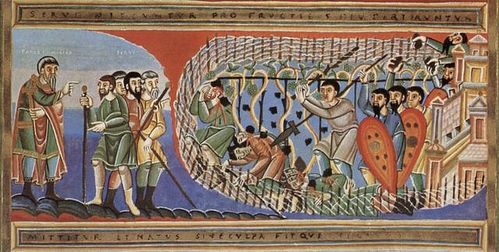
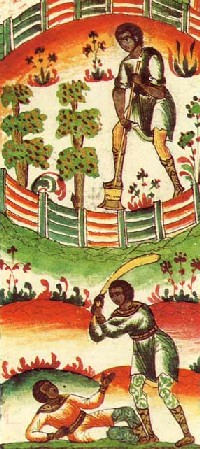
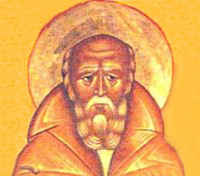
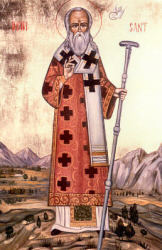 All the information we have about David is based on the unreliable eleventh-century biography written by Rhygyfarch, the son of Bishop Sulien of St. David's. According to it David was the son of King Sant of South Wales and St. Non, became a priest, studied under St. Paulinus on an unidentified island for several years, and then engaged in missionary activities, founding some dozen monasteries, the last of which, at Mynyw (Menevia) in southwestern Wales, was noted for the extreme asceticism of its rule, which was based on that of the Egyptian monks. David attended a synod at Brefi, Cardiganshire, in about 550 where his eloquence is said to have caused him to be elected primate of the Cambrian Church with the understanding that the episcopal see would be moved from Caerleon to Mynyw, now St. David's. He was supposedly consecrated archbishop by the patriarch of Jerusalem while on pilgrimage to the Holy Land, and a council he convened, called the Synod of Victory because it marked the final demise of Pelagianism, ratified the edicts of Brefi, and drew up regulations for the British Church. He died at his monastery at Mynyw, and his cult was reputedly approved by Pope Callistus II about 1120. Even his birth and death dates are uncertain, ranging from c. 454 to 520 for the former and from 560 to 601 for the latter.
All the information we have about David is based on the unreliable eleventh-century biography written by Rhygyfarch, the son of Bishop Sulien of St. David's. According to it David was the son of King Sant of South Wales and St. Non, became a priest, studied under St. Paulinus on an unidentified island for several years, and then engaged in missionary activities, founding some dozen monasteries, the last of which, at Mynyw (Menevia) in southwestern Wales, was noted for the extreme asceticism of its rule, which was based on that of the Egyptian monks. David attended a synod at Brefi, Cardiganshire, in about 550 where his eloquence is said to have caused him to be elected primate of the Cambrian Church with the understanding that the episcopal see would be moved from Caerleon to Mynyw, now St. David's. He was supposedly consecrated archbishop by the patriarch of Jerusalem while on pilgrimage to the Holy Land, and a council he convened, called the Synod of Victory because it marked the final demise of Pelagianism, ratified the edicts of Brefi, and drew up regulations for the British Church. He died at his monastery at Mynyw, and his cult was reputedly approved by Pope Callistus II about 1120. Even his birth and death dates are uncertain, ranging from c. 454 to 520 for the former and from 560 to 601 for the latter. 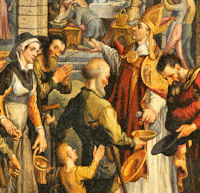 Albinus was born into an ancient and noble family in Brittany. He was a pious child and when he was still young he entered the monastery of Tintillant against the wishes of his parents. Albinus embraced the austerities of monastic life and accepted doing the most humble chores without complaining.
Albinus was born into an ancient and noble family in Brittany. He was a pious child and when he was still young he entered the monastery of Tintillant against the wishes of his parents. Albinus embraced the austerities of monastic life and accepted doing the most humble chores without complaining. 